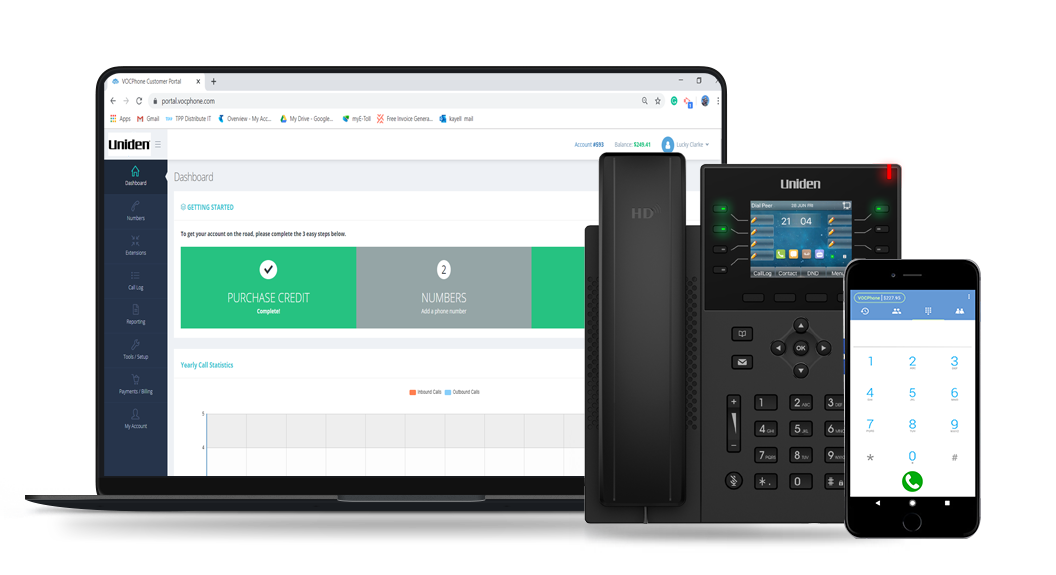
A guide to choosing phone systems for businesses in Australia
Knowing how to find and use the right business phone systems can help you navigate business communication efficiently and easily.

Knowing how to find and use the right business phone systems can help you navigate business communication efficiently and easily.
Seamless communication is an important part of running a successful business and an effective phone system can be a great addition. With many advanced business phone systems available, finding the right device can be tough. This is why it’s important to find the right insights that can help gain valuable insights before you make that all-important decision.
A well-designed phone system not only has the power to improve your customer’s experience, but it also has the potential to improve productivity, streamline processes, and boost efficiency. Whether you’re just starting up your business or already running a successful business, the right phone system is critical to helping you stay ahead of your competition.
From scalability to cost-effectiveness and innovative features, many factors make phone systems for businesses attractive to Australian entrepreneurs. By leveraging these insights, Australian entrepreneurs can make better decisions and switch to phone systems that complement business needs.

Before making a decision, or purchase, it’s important to analyse the communication requirements of your business. Think about factors like remote work, call volume, and any need for features like conferencing and call routing. If your business needs certain features then it’ll help you narrow down your options and choose a business phone system that can accommodate your operations.
When your business scales, so do your communication needs. This is why it’s important to go with a phone system that can scale with your business. Check if you can add new users, phone lines, and other necessary features. Consider future-proofing your business by integrating new technologies like cloud-based solutions to make sure your business stays ahead of your competition.
No matter which phone system you use, it needs to be usable by your employees. Look for user-friendly features that employees can quickly learn without complex learning curves. Prioritise training and ongoing support from the service provider so that your team can leverage the system’s capabilities and improve customer satisfaction and employee productivity with minimal downtime.
Cost is a big part of any purchasing decision, but it’s also important to consider the long-term ROI of investing in a leading business phone system. Think about upfront costs, maintenance expenses, and potential savings from phone bills. The right phone system can pay for itself by streamlining your operations and making a marked improvement in your business’s overall performance.
If you want to save unnecessary expenses and frequent system upgrades, you need to take your future growth trajectories into account.
Select a phone system that can integrate with your existing business tools and software so that you don’t have to sacrifice efficiency.
Choose business phone systems that prioritise the safety of your data and are compliant with industry best practices for securing data.
If your phone systems for businesses are difficult to use or don’t have the required features, it can hurt employee productivity.
Cost is important but sacrificing functionality and quality over affordability can create bigger problems in the business in the future.
From affordable phone plans to 40+ cloud-based business phone system features, Uniden offers seamless communication options for businesses of all sizes and industries.
With a commitment to reliability, quality, and continuous innovation, our goal is to give Australian businesses access to the most advanced business phone systems that can complement the unique needs of businesses.

Speak to our experts and get guidance on selecting the perfect phone system for your business.
On-premises phone systems are traditional systems, where the hardware and software are installed and maintained on-site. Cloud-based systems operate via the internet with the infrastructure hosted by the service provider.
The number of phone lines you need can depend on factors like the number of employees, call volume, and the nature of your business operations. A general rule of thumb is to have one phone line for every three to five employees, but it’s always better to take a closer look at your team and your operations to see exactly how many phone lines you will need.
Look for features such as voicemail, call forwarding, call routing, conference calling, call recording, virtual receptionists, and mobile integration. You can also go for advanced features like video conferencing to make it more beneficial for your business.
Consider a phone system that can easily scale with your business. Check if the phone system can add or remove lines, users, and features as and when your business needs it. Cloud-based systems are very scalable and can adapt according to your changing needs.
The lifespan of a phone system depends on the technology and how it’s used and maintained. On-premises phones can last 5-10 years while cloud-based phones have a much longer lifespan with it being updated and maintained by the service provider.